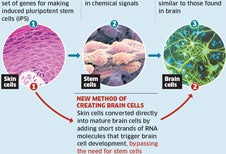Hope for millions of Alzheimer's sufferers as scientists make brain cells from human skin

Your support helps us to tell the story
From reproductive rights to climate change to Big Tech, The Independent is on the ground when the story is developing. Whether it's investigating the financials of Elon Musk's pro-Trump PAC or producing our latest documentary, 'The A Word', which shines a light on the American women fighting for reproductive rights, we know how important it is to parse out the facts from the messaging.
At such a critical moment in US history, we need reporters on the ground. Your donation allows us to keep sending journalists to speak to both sides of the story.
The Independent is trusted by Americans across the entire political spectrum. And unlike many other quality news outlets, we choose not to lock Americans out of our reporting and analysis with paywalls. We believe quality journalism should be available to everyone, paid for by those who can afford it.
Your support makes all the difference.Skin cells from a 30-year-old woman have been turned directly into mature nerve cells similar to those found in the brain using a procedure that promises to revolutionise the emerging field of regenerative medicine.
Click HERE to upload graphic (128k jpg)
Scientists said they were astonished to discover that they could convert a person's skin tissue into functioning nerve cells – bypassing an intermediate stem-cell stage – by the relatively simple procedure of adding a few short strands of RNA, a genetic molecule similar to DNA.
The breakthrough could soon lead to the generation of different types of human brain cells in a test tube which could be used to study a range of neurodegenerative conditions such as Parkinson's and Alzheimer's disease.
"A major problem in neurobiology has been the lack of a good human model. Neurons aren't like blood. They're not something people want to give up," said Gerald Crabtree, professor of pathology at Stanford University Medical Centre in California.
The findings may also one day allow doctors to grow nerve cells directly from a patient's skin cells to regenerate damaged parts of their brain or spinal cord. It would for instance bypass the need to produce stem cells by creating human embryos or embryonic-like tissue.
Previous research has shown that stem cells derived from early embryos could be converted into mature nerve cells. Scientists have also produced neurons from genetically modified skin cells, but these were first converted into embryonic-like stem cells, called induced pluripotent stem (iPS) cells, as an intermediate stage.
However, scientists who carried out the latest study published in the journal Nature have described how they jumped straight from simple skin cells into fully-functioning brain cells by adding two short strands of RNA. "It was very weird. We were astounded," Professor Crabtree said.
"What we made are neurons that are characteristic of the frontal cortex [of the brain] – what you'd imagine would be the most difficult [nerve cells] to make. They're the ones we think with, that we use to put two things together and see the connections, not the ones involved in evolutionary older emotional responses."
The insertion of two key RNA molecules into the woman's skin cells appear to trigger changes to a "molecular machine" that controls chromosomes. This leads to the subsequent development of the skin cells into mature nerve cells which are able to function and behave just like real neurons, Professor Crabtree said.
"They seem to be indistinguishable at this time. We can make both excitory and inhibitory neurons," he said.
Join our commenting forum
Join thought-provoking conversations, follow other Independent readers and see their replies
Comments